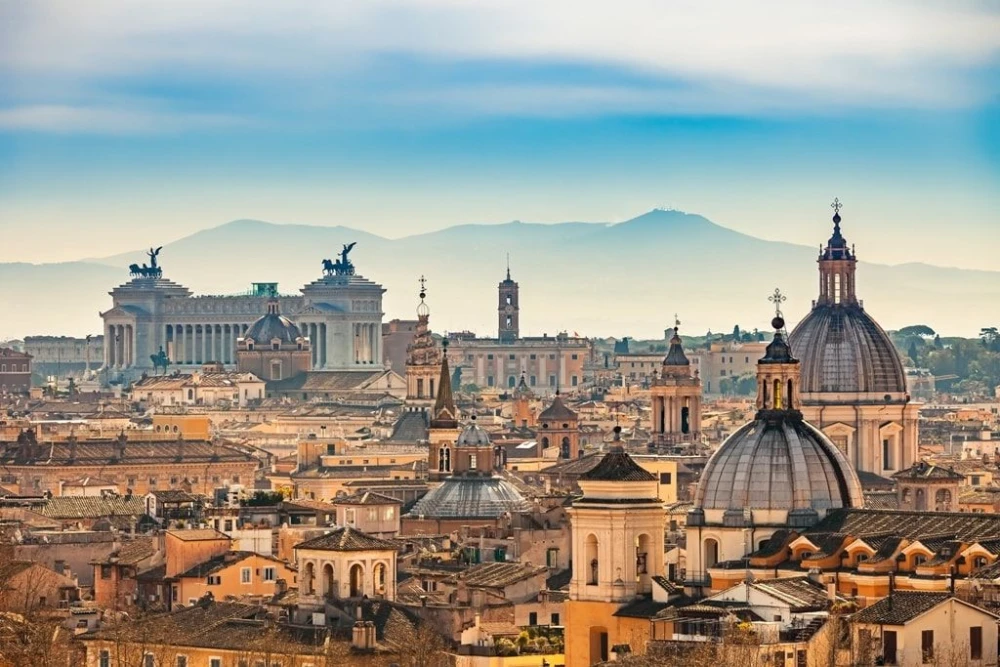15124, Maroysi, Athens, Greece
Civitavecchia (Rome), Savona, Toulon, Valencia, Palma De Mallorca, Olbia-Emerald Coast


Our gateway to the Eternal City, Civitavecchia has served as Rome's seaport since the 13th century, boasting a long and venerable history. Its location near the modern city, made it a perfect vacation resort for emperor Trajan, who built a pleasure villa. while Bernini and Michelangelo designed the harbor fortifications. Yet the Eternal City, the ancient capital of the Western World and the center of Christianity for nearly 2.000 years, is our main reason to be here. YYou can visit the ruins of the Forum and the Colosseum, throw a coin in Fontana di Trevi to make sure you return to Rome one day, take a photo in front of the Vatican, view the splendors of the Sistine Chapel or climb the Spanish Steps, once the heart of Rome's Bohemian Quarter and enjoy a delicious gelato, in the glamorous area.

Savona is a seaport in the northern Italian region of Liguria, on the Mediterranean Sea. Savona is the home port of Costa Cruises for the cruises to East and West Mediterranean, the Canary Islands etc. It has a large, modern cruise terminal, the Palacroisière, which provides all the facilities for its passengers. Large cruise ships dock next to the marina, which is located in the historic center of the city. Most sights are within walking distance of your cruise ship, through a pedestrian bridge near the marina. One of the most important inhabitants of Savona was the navigator Christopher Columbus, whose house, a cottage, is situated in the Savona hills. Highlights are the Cattedrale di Santa Maria (17th c.), located in the heart of the old town, the Priamar palace (16th c.), a reinforced fort just outside the port, the symbol of the town Brandale tower (12th c.), and the main tower (Tower Quarda) of the city Leon Pancaldo tower (14th c.) at the entrance of the old harbor. On the old markets, you will find souvenirs and local products.
Toulon is a city in southern France and a large military harbor on the Mediterranean coast. It is located in the Provence-Alpes-Côte-d'Azur region. The Old Town of Toulon is known for its fountains, each with a different character.
Since its founding as a Roman colony in 138 B.C., the Visigoths, the Moors, the Catalan and Aragonese and the modern tomato-throwers have thrived on the shores of the Mediterranean at the Gulf of Valencia. Valencia is a mix of the old and the new. The historic past is depicted in the stone geometry of the Valencia Cathedral, the mediaeval gates of the Serrano and Quart towers, or the Tribunal de las Aguas (Water Court) and one of the most iconic examples of Gothic architecture in Europe, the Lonja de la Seda, declared an Intangible Cultural Heritage site by UNESCO. The new facet is embodied in the arching white steel of the futuristic City of Arts and Sciences, designed by Valencian architect Santiago Calatrava.

Palma is a busy commercial and cultural center, capital city of the autonomous community of the Balearic Islands of Spain. Situated on the south coast of the island on the Bay of Palma, it became a tourist destination in the 1950s and till today it is considered as one of Europe’s major holiday destinations.The historic centre is the oldest part of the city and a refreshing area for a stroll at the narrow and shady streets, which will give you a chance to peek in at a number of private courtyards. The city flourished during the 19th century and today, it mixes perfectly, the modern hotel chains and flashy shops with the old architecture in the Old Town. A walk along the narrow streets will reveal the restored 13-th century cathedral standing proud in the center of town. Among Palma's lovely sights are the Gothic-style Bellver Castle, the Almudaina Palace, once home to Mallorcan kings, the Arab bath building, the only building dating to the Arab settlement, Plaça del Mercat and interesting art nouveau buildings.
Olbia is one of the busiest ferry ports in Sardinia, founded by the Greeks in the 6th century led by a divine hero named Aristeous who taught the Sadinians how to gather honey. In 350 BC it became the first Carthaginian settlement on the East Coast, only to be thrown out a couple of hundred years later by the Romans. Olbia remained an important Roman port until it was destroyed by the Vandals in 450AD. Olbia’s charms are discrete ones. The historical center is nice enough with a couple of nice squares, a granite romanesque church S. Simplicio, which dates from the middle ages and the 17th century church of S. Paolo.

Our gateway to the Eternal City, Civitavecchia has served as Rome's seaport since the 13th century, boasting a long and venerable history. Its location near the modern city, made it a perfect vacation resort for emperor Trajan, who built a pleasure villa. while Bernini and Michelangelo designed the harbor fortifications. Yet the Eternal City, the ancient capital of the Western World and the center of Christianity for nearly 2.000 years, is our main reason to be here. YYou can visit the ruins of the Forum and the Colosseum, throw a coin in Fontana di Trevi to make sure you return to Rome one day, take a photo in front of the Vatican, view the splendors of the Sistine Chapel or climb the Spanish Steps, once the heart of Rome's Bohemian Quarter and enjoy a delicious gelato, in the glamorous area.
Itinerary







